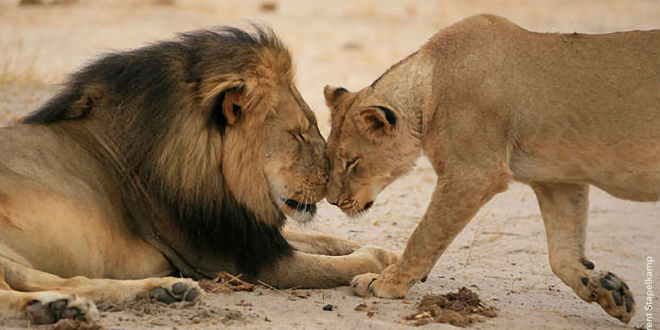The tragic death of one of Zimbabwe’s most loved lions — Cecil — has sparked global outrage. And understandably so. It’s hard to fathom why anyone would want to shoot and kill such an incredible animal.
The American dentist who hunted and shot Cecil with a bow and arrow, reportedly paid $55,000 for a permit to kill a lion. Reports say that Cecil was lured from the protection of the Hwange National Park and then killed. It’s illegal to hunt within the National Park.
Our tendency to favour the interests of those we are most familiar with over those we don’t know might feel ‘normal’. But when it comes to deciding what is fair and just, familiarity can be like waving a magnet in front of our moral compass.
Would Cecil’s final moments have been any easier if he hadn’t been famous? Perhaps for us — because sometimes compassion hurts. But they wouldn’t have been any easier for Cecil. And it wouldn’t have been any less wrong.
If you agree with that then you’ll agree that this is a clear ethical argument for ending trophy hunting of all animals. But it’s also more than that.
The truth is, closing our eyes won’t ease another’s pain — it only shields us from sharing it — and prevents us from stopping it.
The world was understandably outraged that Cecil’s life was cut short. Most would agree that his life was more valuable to him than that single moment of pleasure was for the hunter. How can the two be compared?
There is predictably similar outrage at the thought of eating dogs in some parts of the world. Surely a moment’s culinary pleasure can’t possibly justify slitting the throat of a someone like Lassie. Perhaps, if only they knew dogs like we do, they would recoil at the idea, to
Animal industries know that we’d lose our lunch if we were told that the sausage on our plate was once an individual named ‘Margaret’, who was withdrawn and a bit shy, but dearly loved her babies. Animals in factory farms don’t have names. They are numbers. But they are no less unique individuals.
This lion mattered. Cecil’s death mattered. Not because we knew his name, but because every individual’s life and dignity matters.
So is a world where we extend our compassion to those we don’t know — human and animal — possible? Yes! Compassion is like a muscle — when we exercise it, it gets stronger. And strength in numbers can transform entire traditions, and industries, and most importantly, lives.
ref:onegreenplanet






